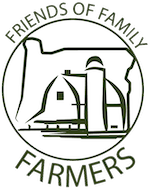by Lindsay Trant, Grassroots Organizer
Since December 2017, Natalie Danielson – my fellow FoFF Grassroots Organizer – and I have facilitated Listening Sessions for farmers and ranchers throughout Oregon. We have completed 18 so far and have heard from almost 200 producers along the way who raise vegetables, fruit, animal products, and just about every other crop or product that can be grown in Oregon—all of them operating on a family-scale.

We traveled well over a thousand miles up, down, and across the state. We stayed in a variety of places, ate at some great restaurants, and explored towns I’d never been to before. By far, my favorite part of this was visiting so many of Oregon’s Grange Halls. We tried to host as many of our Listening Sessions as we could at local Granges because they tend to be centrally located for producers. As one farmer said at the Multnomah Grange in Gresham, “I think this is the first time I’ve ever used a Grange for what it was intended for and this feels really good.”
The goal of our Listening Sessions is to gather input from as many of Oregon’s socially responsible, family-scale producers as we can about what issues they are facing. This is important to us because we want everything we do, every policy we fight for and every program we run, to be supported by Oregon’s family farmers and ranchers.
 Recently, after a great discussion of issues facing farmers on the North Coast, one producer laughed and asked “Is it depressing going to all of these listening sessions and hearing about all these problems?” You might think that visiting nearly 20 different venues, and hearing from so many small and mid-sized producers about the most challenging issues they are facing would be kind of a downer…. But, it’s not! This process has actually been incredibly inspiring. In the past 5 months, I have personally met well over 100 producers who are extremely dedicated to producing food for their communities in the most socially and environmentally responsible manner possible, while trying to keep their operations financially viable. These producers make it possible for me to do what I love: Eat and fight for good food! And the insights and experiences these producers shared with us will be invaluable in helping Friends of Family Farmers continue to be the most effective small farm advocacy group in the state.
Recently, after a great discussion of issues facing farmers on the North Coast, one producer laughed and asked “Is it depressing going to all of these listening sessions and hearing about all these problems?” You might think that visiting nearly 20 different venues, and hearing from so many small and mid-sized producers about the most challenging issues they are facing would be kind of a downer…. But, it’s not! This process has actually been incredibly inspiring. In the past 5 months, I have personally met well over 100 producers who are extremely dedicated to producing food for their communities in the most socially and environmentally responsible manner possible, while trying to keep their operations financially viable. These producers make it possible for me to do what I love: Eat and fight for good food! And the insights and experiences these producers shared with us will be invaluable in helping Friends of Family Farmers continue to be the most effective small farm advocacy group in the state.
And this helps underscore why we do what we do. While on the road, I got to hear about some of the positive impacts FoFF’s work has had for family farms in Oregon. For example, I met a landholder at the Beavercreek Listening Session who found the perfect partnership for his farm through our Oregon Farm Link program. Separately, a producer in Banks, when explaining to other producers a policy championed by FoFF back in 2011 called the 1,000 Bird Exemption, said: “My operation would not be where it is today without the 1,000 Bird Exemption. That exemption is how we were able to start our operation.” This farm is now just days away from opening up their own on-farm, licensed poultry processing facility.
While my Listening Session travels were focused on the western side of Oregon, Natalie was mostly on the road East of the Cascades, hearing from producers about the unique issues that farmers and ranchers face in the drier regions of Oregon. For her, it was inspiring to hear from producers seeking to provide food for their communities in areas with small but growing support for local agriculture. One of the best parts of our Listening Sessions is seeing the supportive network of producers getting together to strategize about local issues big and small. For example, in Enterprise a “chicken moving day” was suggested to help a chicken farmer retrieve her flock of very free range chickens out from their favorite tree and to her new property. Now that’s community supported agriculture!
These are just a few of the inspiring stories we’ve heard about how our programs and policy efforts have positively impacted family farms around Oregon. Our team at FoFF is excited to use what we learned from our 2018 Statewide Listening Session Tour as we refine our program work and look towards the 2019 Legislative Session.
Did you miss out on attending one of our 2018 Farmer and Rancher Listening Sessions? It’s not too late to make your voice heard through our Farmer and Rancher Survey. This survey is open until May 31, 2018 and will help us in compiling the final report from our 2018 Listening Session tour.


